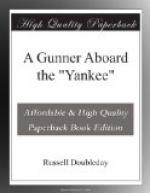“Morse,” like the good fellow he was, got up and sang this song to the tune of “Billy Magee Magaw”:
When the “Yankee”
goes sailing home again,
Hurrah!
Hurrah!
We’ll forget that we’re
“Heroes” and just be men,
Hurrah!
Hurrah!
The girls will giggle, the
boys will shout,
We’ll all get a bath
and be washed out,
And we’ll all feel gay
when
The “Yankee” goes
sailing home.
The city bells will peal for
joy,
Hurrah!
Hurrah!
To welcome home each wandering
boy,
Hurrah!
Hurrah!
And all our sisters and cousins
and girls
Will say “Ain’t
they darlings?” and “See the pearls!”
So we’ll all feel gay
when
The “Yankee” goes
sailing home.
Our patrolling cruise will
soon be o’er,
Hurrah!
Hurrah!
We’ll be happy the moment
our feet touch shore,
Hurrah!
Hurrah!
And “Cutlets”
and “Hubbub” and all the rest
May stick to the calling they’re
fitted for best,
But we’ll all
feel gay when
The “Yankee” goes
sailing home.
Even “Bill” was able to find voice enough to shout “Good!” and give “Morse” a resounding slap on his wet oilskinned shoulder. The song voiced our sentiments exactly, and cheered us a lot. None of us believed that “Our patrolling cruise would soon be o’er,” however, and hardly a man would have taken his discharge had it been offered to him that moment. We had put our names to the enlistment papers and had promised to serve Uncle Sam on his ship the “Yankee” faithfully. We had gone into this thing together, and we would see it through together. Still we would “All feel gay when the ‘Yankee’ goes sailing home.”
“That reminds me of a story,” began Potter, when “Long Tommy,” the boatswain’s mate of the watch, interrupted with, “Potter, take the starboard bridge. I will send a man to relieve you at the end of an hour.” So Potter went forward to relieve his mate, who had stood an hour of lookout duty on the starboard end of the bridge.
He went forward, swaying with the motion of the ship, his oilskin trousers making a queer, grating noise as one leg rubbed against the other, and “Stump” said, “I’ll bet he won’t stay with us long; he talks too much.” A prophetic remark, as future events proved.




